|
|
|
Sort Order |
|
|
|
Items / Page
|
|
|
|
|
|
|
| Srl | Item |
| 1 |
ID:
154059
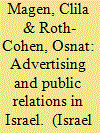

|
|
|
|
|
| Summary/Abstract |
This article offers a comprehensive overview of the evolution of marketing in Israel. By merging the histories of two leading disciplines within the marketing mix, advertising and public relations, it offers a fresh direction in marketing historiography based on the story-telling method and the periodization approach. Studying the evolution of both professions in a synergistic manner leads to several interesting insights that are otherwise overlooked. The article demonstrates how an integrated approach provides a better understanding of the evolution of both fields and substantially enriches the history of the professions within the marketing arena.
|
|
|
|
|
|
|
|
|
|
|
|
|
|
|
|
| 2 |
ID:
131480
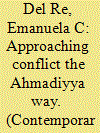

|
|
|
|
|
| Publication |
2014.
|
| Summary/Abstract |
The role and incidence of the Ahmadiya community in Israeli society, with its around 2,000 members, is not related to the dimension of the community, its religious activities or its dissemination on the territory. It is related to the strong social and political engagement of the community not only in religious but also in civil society activities where it resides, despite all the difficulties that derive from its disputed role in Islam. The Ahmadiyya community in Haifa constitutes a relevant example of contribution to peaceful and productive coexistence. Haifa itself is characterized by a very interesting social and political climate, by which it is considered a "model" of coexistence in Israel, despite the fact that many contrasts and contradictions persist, such as forms of discrimination and inequalities. The civil society is particularly active, and institutions and NGOs devoted to the Arab-Jewish dialogue are many. Religious and political leaders communicate and participate together in various events, where their openness and mutual respect are intended to symbolize harmony with the intent of this being mirrored by the whole society. The Ahmadiyya Community plays an active role in this evolving process. The author, who has carried out qualitative research in Haifa to film a scientific documentary on the Holiday of Holidays and the validity of the Haifa model of coexistence, applied participant observation in the framework of grounded theory to analyze the role and impact of the Ahmadiyya community in the complex Israeli context, also on the basis of extensive in depth interviews with community members and leaders
|
|
|
|
|
|
|
|
|
|
|
|
|
|
|
|
| 3 |
ID:
112528
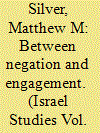

|
|
|
|
|
| Publication |
2012.
|
| Summary/Abstract |
The image of America in Hebrew language novels serves as a compelling barometer of trends in Zionist culture and Israeli society. For decades after Israel's establishment, a caustically negative approach to American Jews and American life colored novels authored by Hebrew writers who helped fashion the image of a new Israeli personality, the pioneering sabra. This article argues that these "negation of the American Diaspora" novels constitute just one phase of Hebrew fiction's encounter with America. It analyzes the roots, implications and content of forms of positive engagement (albeit not full endorsement) of American Jewish milieus that are appreciable in Hebrew novels written before Israel's establishment, and in the last ten or fifteen years.
|
|
|
|
|
|
|
|
|
|
|
|
|
|
|
|
| 4 |
ID:
116190
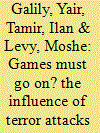

|
|
|
|
|
| Publication |
2012.
|
| Summary/Abstract |
The terrorist campaign against Israel, euphemized as the 'al-Aqsa intifada', affected Israeli society in terms of perceptions of personal security, economic and political stability and aspects such as tourism and culture. The Israeli sporting scene was affected as well. From 2001 to 2004, international sports organizations adopted policies in stark contrast to one another. While some banned certain sports events from taking place in Israel, others obliged athletes to come to Israel and fined them for refusing to do so. A comparison of how these organizations chose to act in similar cases around the world reveals a striking inconsistency. An examination of the events and information provided in personal interviews indicates that sports associations fail to define terrorism and the conditions under which competitions should be banned.
|
|
|
|
|
|
|
|
|
|
|
|
|
|
|
|
| 5 |
ID:
130505
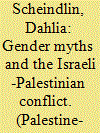

|
|
|
|
|
| Publication |
2011.
|
| Summary/Abstract |
Israeli society has distinct and complex gender roles, and the identities of both men and women are largely derived from militaristic socialization and a wartime mentality. Yet these has not been extensive systemic research comparing the attitudes of men and women toward the Israel-Palestine Conflicts.
|
|
|
|
|
|
|
|
|
|
|
|
|
|
|
|
| 6 |
ID:
146857
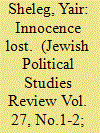

|
|
|
|
|
| Contents |
The disengagement from the Gaza Strip and parts of Northern Samaria in 2005 affected the religious Zionist public more than other sectors of Israeli society because most of the settlers are religious Zionists. Yair Sheleg examines the changes among religious Zionists during the decade since the disengagement. He discusses the question whether such changes were the direct results of the disengagement or could be attributed to general trends in Israeli society. The article focuses upon five major attitudes of the religious Zionists that underwent changes, as follows: the attitude toward the state; toward the authorities; toward religious faith; toward political opponents and toward the Arabs. Sheleg notes a more critical attitude toward the state, a distancing from formerly esteemed rabbis and political figures, a tendency toward spirituality and less institutionalized faith, harsher language against the Left and an increase in attacks against Arabs. Despite the above, loyalty to the State of Israel remains steadfast, along with a willingness to contribute to society and no major loss of religious faith.
|
|
|
|
|
|
|
|
|
|
|
|
|
|
|
|
| 7 |
ID:
149190
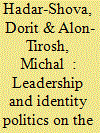

|
|
|
|
|
| Summary/Abstract |
This article addresses identity politics in Israeli society on the eve of the 2015 elections as recounted in interviews with Israeli children. Children belonging to four groups of Israeli society (secular Jews, religious Jews, Ethiopian Jews and Arabs) were asked about the suitability of male and female candidates running for the position of Israeli prime minister. The findings can be viewed through two types of power relations: gender power relations and power relations between groups of different collective identities. Gender power relations reflect gender inequality. One example of this inequality is that female candidates are perceived as transparent in regard to their suitability for the post of prime minister. Power relations between different groups reflect the hierarchy of collective identities; secular Jews hold a hegemonic status, while other groups weaken each other in order to strengthen their own relative status within the hierarchy. This study shows that power relations between the four groups in Israeli society are present and internalized as early as elementary school a finding that holds important implications as Israel works toward its ultimate goal of democracy.
|
|
|
|
|
|
|
|
|
|
|
|
|
|
|
|
| 8 |
ID:
144674
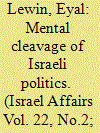

|
|
|
|
|
| Summary/Abstract |
In societies marked by numerous diversities, like the Jewish-Israeli one, understanding social cleavages might show a larger picture of the group and form a broader comprehension of its characteristics. Most studies concentrate on somewhat conventional cleavages, such as the socioeconomic cleavage, the ethnic cleavage, the religious or the political one; this article, by contrast, suggests a different point of view for the mapping of social cleavages within Israeli society. It claims that the Jewish population in Israel is split into two competing groups: stakeholders versus deprived. These categories of social identity are psychological states of mind in which no matter how the national resources are distributed, the stakeholders will always act as superiors, even if they are in inferior positions, while the deprived will always take the role of eternal underdog even if all of the major political ranks come under their control. This article brings about a review of over a century of ideological debates within the Zionist movement; it reveals how understanding the logic of the Israeli political discourse as a competition between the two newly defined social groups enables a better comprehension of the inherent tension between them.
|
|
|
|
|
|
|
|
|
|
|
|
|
|
|
|
| 9 |
ID:
131109
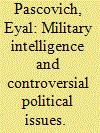

|
|
|
|
|
| Publication |
2014.
|
| Summary/Abstract |
Contrary to intelligence services in other democracies worldwide, the activity of the Israeli Directorate of Military Intelligence, AMAN, is not merely centered around collection and research regarding military intelligence matters. Instead, AMAN covers the majority of intelligence activity arenas, including intelligence regarding state-related issues. This field of activity presents a situation where AMAN's officers, and predominantly, its research division, are compelled to deal with sensitive issues embedded well within Israeli political and public controversy. This is commonly illustrated in the field of 'Intelligence for Peace' in general and more specifically in the Palestinian arena. Intelligence research surrounding the question of Palestinian commitment to peace throughout the Oslo Process and following the onset of the al Aqsa Intifada - activity classified as 'Intelligence on Intentions' - placed AMAM at the heart of political debate in Israel and resulted in bitter internal disagreements in AMAN as well as tensions between the intelligence service and the political leadership. Throughout the years, numerous recommendations have been repeatedly voiced to end AMAN's monopoly over Israel's national intelligence assessment (including aspects of intelligence regarding state-related issues). These recommendations were based predominantly on hindsight evaluations, such as AMAN's repeated failures in intelligence assessments. This paper calls for gradual termination of AMAN's activity of intelligence regarding state-related issues, in light of its contradiction with the appropriate military-political separation in a democratic society. Moreover, it places AMAN at the heart of the political debate dividing Israeli society.
|
|
|
|
|
|
|
|
|
|
|
|
|
|
|
|
| 10 |
ID:
177746
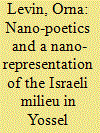

|
|
|
|
|
| Summary/Abstract |
This article discusses the unique nano-poetics and its nano-representation of the Israeli milieu, as found in Yossel Birstein’s short-short bus-stories. While these stories demonstrate the author’s poetics, they also constitute a miniature replica of Israeli society, emphasising the following four major aspects of this society: (1) the tension between the Jewish past and the Israeli present; (2) the complex dynamics between private and public life; (3) the gap between newcomers and veteran immigrants; and (4) a mentality dominated by nervous tension combined with the unique form of audacity known as chutzpah. Birstein presents the bus both as the inspiration for and as the object of his writing, and this narrative framework showcases the many variants in Israeli culture.
|
|
|
|
|
|
|
|
|
|
|
|
|
|
|
|
| 11 |
ID:
171050
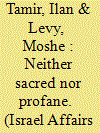

|
|
|
|
|
| Summary/Abstract |
The significant changes undergone by Israeli society notwithstanding, the Holocaust remains one of the foremost components of the collective memory, increasingly evoked in the public space including the media, popular music, and sports. Focusing on the infiltration of Holocaust discourse into the sphere of sports, as reflected in media coverage of sporting events, this article reveals a wide spectrum of Holocaust uses ranging from the derogatory to the laudatory – as means to inspire performance and extol achievements and unique sports moments.
|
|
|
|
|
|
|
|
|
|
|
|
|
|
|
|
| 12 |
ID:
172147
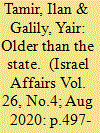

|
|
|
|
|
| Summary/Abstract |
In May 1929, the Israel Football association was officially recognised by international sport organisations, after extensive political efforts. International recognition effectively institutionalised Israel’s popular sport, 1 which would eventually become not only the focus of massive interest but also a major actor in the social, economic, and political spheres of Israeli society.
|
|
|
|
|
|
|
|
|
|
|
|
|
|
|
|
| 13 |
ID:
164906
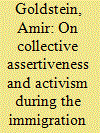

|
|
|
|
|
| Summary/Abstract |
This article focuses on the ways in which over 200 families of Yemenite immigrants, who founded the city of Kiryat Shmona, the development town situated at the edge of Israel's Northern District, functioned as a group during the immigration process. This case study coincides with the trend – within research of mass immigration to Israel – that relates the historical narrative through the perspective of the immigrant and settler groups, rather than from the vantage point of the establishment in charge of their absorption. The affair could have gone down in the annals of history as a story of weakness and victimhood: hundreds of immigrants were sent off to settle in an outlying peripheral region and were compelled to integrate into an environment where the financially and political-powerful kibbutzim were preponderant. Yet the Yemenite immigrants of Kiryat Shmona turned out to be a consolidated, opinionated, fighting and stubborn force that succeeded, in trying conditions, to assert their voice, struggle for their values and identity, affect major changes within the immigration–absorption system.
|
|
|
|
|
|
|
|
|
|
|
|
|
|
|
|
| 14 |
ID:
112952
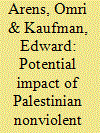

|
|
|
|
|
| Publication |
2012.
|
| Summary/Abstract |
This article assesses the potential impact that a massive, organized, and sustained nonviolent Palestinian resistance movement can have on Israeli society. Based on the recognition of the growing success of nonviolent strategies internationally, the subjective Israeli perceptions due to a Jewish collective memory of victimhood, and the perceived efficacy of violent and nonviolent actions through the IsraeliPalestinian conflict, we conclude that such an unprecedented strategy has a strong likelihood of yielding an independent Palestinian state alongside a state of Israel.
|
|
|
|
|
|
|
|
|
|
|
|
|
|
|
|
| 15 |
ID:
175464
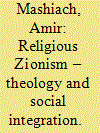

|
|
|
|
|
| Summary/Abstract |
This article explores the theology behind the integration of religious Zionists in all spheres of activity in Israel, from commerce and industry to agriculture, academia, and the defence establishment. It argues that religious Zionism is not a combination of religiosity and Zionism but a movement motivated by a distinct theology of integration that espouses a combination of Torah and work, not as part of one’s natural duties to support one’s family but as an integral part of one’s religious duties.
|
|
|
|
|
|
|
|
|
|
|
|
|
|
|
|
| 16 |
ID:
073595
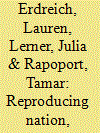

|
|
|
|
|
| Publication |
2005.
|
| Summary/Abstract |
This paper discusses the reproduction of hegemony and social hierarchy through education. It brings together two case studies of marginal groups at a university-Russian Jewish immigrants and Palestinian Israeli women-who make sense of their position in social hierarchies and power relations through constant interpretative work on the various dimensions of university knowledge. The article reveals how marginal actors' interpretations of knowledge simultaneously are guided by students' positioning vis-à-vis the dominant collective and also articulate and redesign positioning. The two groups redesign their marginalities vis-à-vis the Israeli-Jewish collective by transforming knowledge to identity. In so doing, these groups reproduce national borders of Israeli social hierarchy, while working to change the meaning of these borders for their group's positioning.
|
|
|
|
|
|
|
|
|
|
|
|
|
|
|
|
| 17 |
ID:
174035
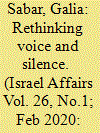

|
|
|
|
|
| Summary/Abstract |
Israeli society is complex, multifaceted, heterogeneous, pluralistic, hectic and loud. Yet, as this volume claims, within this cacophonic arena, islands of silence and pockets of voicelessness remain. Obviously, not all of these could be addressed in this volume, leaving some unexplored: the voices of those suffering from terminal illness, of elders subjected to ageism, of the fat and the disabled, of the LGBT community and of non-Jewish migrants in Israel, to mention but a few that are not commonly heard. This article offers some insights into these unrevealed realities, mainly of those ‘seethrough’ sectors such as labour migrants (usually called foreign workers) and asylum seekers.
|
|
|
|
|
|
|
|
|
|
|
|
|
|
|
|
| 18 |
ID:
118536
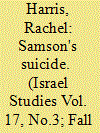

|
|
|
|
|
| Publication |
2012.
|
| Summary/Abstract |
Drawn from the biblical narrative, the image of Samson came to be used as a depiction of the self-sacrificing nationalistic ideal that dominated Zionist ideology. Though much has been said about the popular and widespread use of this image in Israeli society and culture, I contend that it was not solely his heroism, strength, and symbolic identity as the new Jew that marked this biblical figure for reuse in popular forums, but that his final suicide (martyred sacrifice) underpinned the drama of the Samson narrative. The symbolism of Samson soldiers willing to sacrifice themselves for the modern nation state altered as attitudes towards sacrifice for the collective changed. The heroism of the Samson myth collapsed, and subsequently was inverted, becoming a powerful tool for criticizing the Israeli military hegemony. This article traces a literary history of the changing narrative of the archetypal Samson.
|
|
|
|
|
|
|
|
|
|
|
|
|
|
|
|
| 19 |
ID:
121458
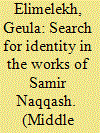

|
|
|
|
|
| Publication |
2013.
|
| Summary/Abstract |
Samir Naqqash (1938-2004) was born in Baghdad and migrated to Israel in 1951. This article describes his divided soul, his attempts to adapt to a new homeland and his inability to develop a sense of belonging to Israeli society. The study is based on two short stories, 'Willow Night', which describes the collapse of an old world and the loss of Jewish values, and 'Tantal', a story of childhood. A major theme in Naqqash's writings is the search for identity, a direct result of the author's inability to detach himself from his previous identity as an Iraqi Jew. This theme is intimately connected to one of the most important motifs in his stories, rootlessness. The author feels torn from a previous perfect world, now lost - a world which he now adores and remembers with sentimental yearning. In his stories he depicts a number of characters whose emigration to Israel induced a profound shock in them, which eventually led to their mental and physical downfall.
|
|
|
|
|
|
|
|
|
|
|
|
|
|
|
|
| 20 |
ID:
131859
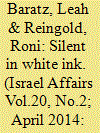

|
|
|
|
|
| Publication |
2014.
|
| Summary/Abstract |
This article seeks to reflect the narrative of discrimination in the writing of Israeli Palestinian women poets through the motif of Silence. This narrative emerges from the analysis and categorization of this motif in some 200 poems, written in Arabic and translated into Hebrew, thus revealing the poets' attitudes to social and political issues. This article shows that the poets' identity is perceived as the marginalized 'other' in Israeli society, not only in terms of nationality and ideology but also in terms of gender.
|
|
|
|
|
|
|
|
|
|
|
|
|
|
|
|
|
|
|
|
|